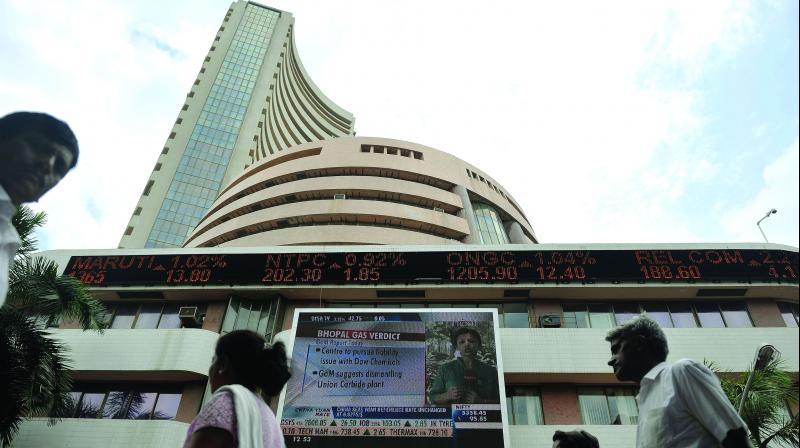BSE’s market capitalisation rises by Rs 7.8 lakh crore this month
Sensex notches up nearly 1,670 points in 6 sessions.

Mumbai: The massive stock rally over the past few days have added over Rs 7.80 lakh crore to the BSE’s market capitalisation as investors started betting big on the Narendra Modi-led alliance making gains in the upcoming general elections.
The Sensex has surged by 1,668.22 points this month, taking the total market cap of the BSE to Rs 148.2 lakh crore as on Tuesday from Rs 140.41 lakh crore on February 28. The Sensex gained 481.56 points on Tuesday and closed above the 35K-mark at 37,535.66 points after rising 382.67 points on Monday.
The bull run is mainly driven by aggressive buying by foreign funds, which have pumped in Rs 6,747 crore to equity markets so far this month, according to NSDL data. Foreign investors have turned net buyers in the Indian market, as they bought equity worth Rs 17,219.62 crore in February. They were net sellers to the tune of Rs 4,262 crore in the market in January.
“The market is factoring that the current government would have a good chance of coming back. The market prefers a stable government instead of a coalition,” said Debabrata Bhattacharjee, Head of Research, CapitalAim.
"The market continued the bullish rally as investors are expecting the formation of a stable government at the Centre. The rally was broad-based across all sectors barring IT," Vinod Nair, Head of Research, Geojit Financial Services Ltd, said on Tuesday.
Apart from the poll factor, a major driver of the current rally is the underperformance of the benchmark in comparison to other Asian markets, especially the Chinese markets.
Despite uncertainties over trade war and geopolitical tensions, emerging markets like India and China are likely to provide better returns to investors during the year, according to Morgan Stanley.
The MSCI Emerging Markets (EM) Index, the widely tracked global benchmark for emerging markets, have kept overweight stands on India, China, Singapore and Brazil, while going underweight on other emerging markets like Australia, Mexico and the Philippines.
The MSCI EM Index is set to gain as much as 8 per cent this year.
The reasons for a rosy emerging markets outlook is on account of better-than-expected corporate earnings in the region, the Morgan Stanley said in a report.
The investment bank also expects that the fund flows into these markets would remain robust this year as the US Fed has decided for a longer-than-expected pause on the interest rate hike.
EM equities have had a strong start to the year, generating a total return of 8.3 per cent year-to-date (YTD). While MSCI China has delivered 16.2 per cent YTD, the overall EM index has actually lagged developed market (DM) YTD.
“EM equity have pulled back relative to DM markets in 2019 YTD after significant outperformance last year, we think this is a classic "pause that refreshes" opportunity to re-engage,” Morgan Stanley said.
It said the MSCI EM Index is likely to be driven higher by additional stimulus from Beijing and bullishness on Chinese shares, among other factors. Chinese stocks make up 32.12 percent of the index.
So far in 2019, the CSI 300—an index of the largest stocks traded on the mainland—as well as Hong Kong’s Hang Seng Index, have outperformed MSCI EM Index.
The investment bank said the index could rally due to factors like bullish outlook for Chinese stocks, upcoming stimulus for China and the price of copper.
However, there are certain risk factors like the weak global growth, trade environment and upcoming elections in several emerging market countries.

